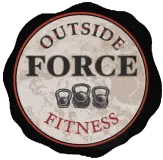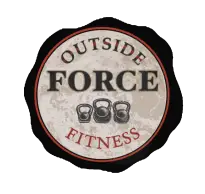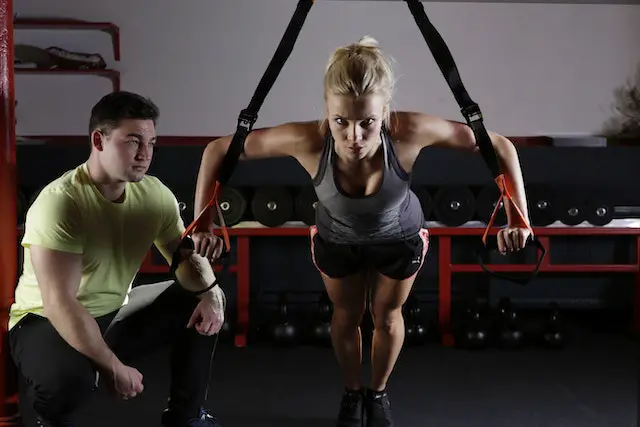If you are looking for a good personal fitness trainer, you’ll want to look for these qualities.
First Impression
The fitness trainer should be approachable.
From across the room, your first response should be that you could walk up to them and start talking. It should be someone you can talk to.
A lot of people get distracted by muscles. Don’t look at that, look at the person. Is the fitness trainer stressed? When they smile is it forced? Are they standing up rigidly or is it effortless? Do their eyes dart around in a shady way or are they confidently just doing what they are doing?
If you’re not good at reading people, then just go talk to them. If the guy or girl is trying their heart out to sign you up, then forget it. You don’t want a trainer desperate to make a buck. A good trainer has a wealth of clients.
A Good Listener
I’ve said before that 90% of my job is observation. This includes listening. A trainer has to shut up and listen to and observe the person that is in front of them.
If you walk up to a personal trainer and they start talking profusely, walk away.
If you feel like there was something you wanted to say, but didn’t get an opportunity to say it, walk away. It is 100% my a fitness trainer’s job to perceive what is going on with their clients. This includes the basic skill of seeing when someone wants to say something.
For crying out loud, on a daily basis, a personal trainer has to talk about one of the most touchy subjects that man has ever dealt with – the human body. It should be standard training that he or she can identify when something needs to be said and to be able to provide a comfortable environment in which to say it.
I have saved my own ass repeatedly by getting my clients to say what is actually going on with them. There is a myriad of topics that people consider taboo. Most of the time they just want to perform well for the trainer and will withhold vital information like: “I feel dizzy” or “I might puke in a second” or “I have cramps and if you say one more think I’m going to wring your neck.”
If I don’t figure out what is going on with the person in front of me, then I’m totally screwed and am liable to get strangled by the woman who is experiencing a rough menstrual cycle. Please don’t take this as me picking on women. It is a change in the body that a trainer should know about so that he or she can back off the exercise intensity as needed.
To give you an analogy, some mechanics can hear an engine start up and know exactly what is wrong with it. They reach inside, turn one screw and the whole thing starts running smooth. That should be a fitness trainer. They should know bodies well. They should know people well.
For anyone I hire, I hold them to the same impossibly-high standards.
They Practice What They Preach
Never take moral advice from an adulterer. Never take financial advice from a banker. And never take health advice from a person who is unwell.
I can’t stress this enough. The ideal trainer would be experienced and conversant in bodybuilding, endurance training, a few specific sports, kettlebell training, and at least a few other bodies of knowledge.
If you come across one trying to sell you something, but can’t totally go on a roll about (or practice) one field or the other, dump them.
Your ideal trainer would be well versed across a range of modalities and would be practicing one or more at that time.
Ask them what their workout was that day. If you get a load of bullshit, walk away.
If you see enthusiasm hit their face and an explanation of how they were trying to accomplish a personal record with their Clean and Jerk (an Olympic lift), then you’ve got yourself a keeper. If he or she can admit their own shortcomings to a newcomer, and if they can admit their own weaknesses – pay whatever he or she is charging because they are probably worth more.
How Are Their Current Clients Doing?
The clients of a successful trainer are not all fit, lean models of perfection. They are everyday people looking to get from one point to the next.
I’ve seen people walk into a gym and pick the trainer who is training the athlete. They’ll say “I want that guy” as if that guy got that girl to look like Wonder Woman.
In order to assess how a personal fitness trainer is performing in the gym, you’ll want to talk to their current clients (and also ex-clients). The 300 pound man on the treadmill that he is currently training may have been a bed-ridden 400 pound person before and a winning client.
The hobbling woman he has doing dumbbell exercises may have been in a wheelchair a month before.
You literally don’t know until you ask. It is a simple drill. You walk up to the person and say that you have a quick question when they are available. Once you get into a discussion with his or her client, ask them what they think of them as a trainer.
You’ll get a rave response or a conservative review or an “I’m not sure” kind of response. Only go for the rave responses. Those people that say “This trainer does miracles! The doctors were going to cut off my leg but he saved me!” kind of answers.
The actual content of the discussion doesn’t matter. It is the overwhelmingly positive response that you are looking for. If he’s that good with a high-risk client, he’s light years ahead every trainer on planet earth.
Knowledge
There are three classes of fitness trainers:
- Book knowledge only
- Experiential only
- Mix of book and experience
To rank them in order of value:
- Mix of book and experience
- Experiential only
- Book knowledge only
I have learned a significant amount of what I know from the “experiential only” crowd. The “book knowledge only” crowd should be held at arm’s length.
I started in a gym with some of these dudes and dudettes with a wealth of self-taught knowledge. I loved working with them and taking in what they had to say. Sometimes they were frustrated because they didn’t have the words to describe what worked.
These guys and gals are like people who have done tons of studies but don’t know why these studies worked or not. They just know “I applied Formula X to Client Q. When done in this way, it produces Result P.” They’ve got a little bit of theory in which to make sense of their studies, but the sheer wealth of studies is often underrated.
Sometimes they are wrong, most of the time they are right.
The “book knowledge only” guy is a wild card. He may injure you.
The obvious ideal is to have both. I’ve been a fitness trainer while going to college to study Exercise Science. I was ahead of my class in my grades, ability to think with the subject and my own fitness level. They called me the bionic man.
I was lucky to study fitness while working as a fitness trainer. This is what produces the best kind of fitness guy or girl.
So ask your trainer what they have studied and how many clients they have trained and what the value is in having done one or both.
You are looking for the man or woman who has experience and has done the book work.
A Good Fitness Trainer Will Ask Questions
I never just accept a client blindly. I ask questions.
In order to feel out whether or not we will do well together, I try to learn as much as I can about the person. I am trying to see if they fit in with any of my other clients or if I need to set aside an entire hour separately for this person.
I am trying to find out if we can do business together.
A good trainer might be a picky trainer. They ask questions. I won’t just train anyone. If I see that you are accident prone, have a strong body odor and are a big medical risk, I’ll pass on you.
Attention to Detail
A good personal trainer looks at his clients with great discernment. He or she is looking at the good and bad in every maneuver or movement. Not everything needs to be commented upon.
He or she is always considering which cue or feedback to give their client. No client is perfect. We all have room for improvement. Even if the form is perfect, the weight lifted isn’t enough.
If you’ve ever been a perfectionist, then you’ll understand what you’re looking for.
While observing Sally’s deadlift, I’m running through scenarios in my head as to how my advice of “Your thoracic spine really needs to extend more” will be taken. I’m also working over the exact words to use because she may not have a clue what “thoracic spine” means. And if Sally is doing better than last week you won’t hear a peep out of me aside from “Damn good, Sally!”
I can look at someone and tell you if they are a professional. Even if you are a professional interior painter, you’ll be able to tell the difference between a professional or a dilettante.
A professional’s attention is completely outside themselves and on their task.
Responsibility
If you come across a trainer who blames others for things, stay away.
If you ask him “Have you ever had a client sustain an injury while training under you?” and they say “Yes, but the woman didn’t do what I said.” Just kindly walk away.
A responsible trainer would answer “Yes, I had a woman who was doing weighted step ups and she hurt her knee. I should have put her on a lesser gradient, but I felt pressure to give her a good workout because she was on a tight schedule to lose weight for a wedding. I don’t do that anymore, I make sure that every one of my clients can do an easier version of the exercise without any pain, then we stack up the weight.”
An irresponsible trainer won’t admit that they have ever done anything wrong. A responsible guy won’t have any issues saying what went wrong and what he learned from it.
You could also argue that a truly responsible trainer has never injured anyone. In fact, I pride myself on the fact that I haven’t ever seriously injured anyone. But I do have situations where someone around me did have a minor injury and there is something I could have done about it.
Also, if it is a new trainer he may just innocently and honestly say “No, I’ve never hurt anyone.”
Conclusion
The qualities of a good personal trainer are:
- Approachable
- Good listener
- Knowledgeable
- Practice what they preach
- They ask questions
- Pay attention to detail
- They are responsible
And above all, they are honest.
A fitness trainer (and any health professional) should want to help you. This is what they live and breathe. At the end of the day it isn’t their bank account that makes them happy that they’ve lived. It is the fact that they helped people.
Many days I leave work and think about how well my clients are doing and it just makes me happy. This is in direct opposition to the “leave work and don’t talk about it unless I have to” mentality which seems to be present with a lot of jobs.
So when you see a trainer, make sure that they live and breathe service and help. We’ve all got our own spice and flavor. Some go for tough love, others will hold your hand through it.
Just hop around until you find one that works with your personality.


